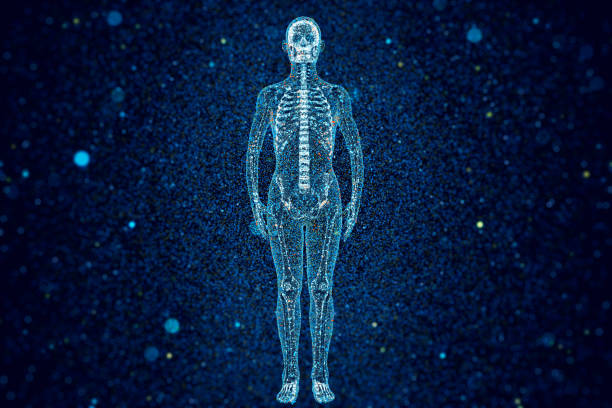The human body is a marvel of biological engineering, which is beyond exceptional.
It has various physiological and homeostatic mechanisms that function to keep us alive and comfortable.
The human body was designed to be adept at responding to changes in the environment both anatomically and physiologically.
If you need more reason to appreciate the marvel that is the human body, read on to find out ten amazing things the body does to keep you alive and well.
Here are 10 remarkable things the human body does to keep you alive.
1. Shedding dead skin cells
The skin sheds about 30,000 to 50,000 skin cell, every single minute of your life.
This mechanism is important in getting rid of dead skin cells and harmful organisms on the surface of the skin.
Note that only the eyes do not shed. Shed skin are quickly replaced. [1]
Without the continuous shedding and replacement of skin cells, our skin would be unable to effectively protect us from environmental hazards such as pathogens and UV radiation.
Accumulation of dead skin cells could lead to infections, impaired wound healing, and various dermatological conditions.
2. Fetal stem cells repair
When a woman is pregnant and an organ in her body is damaged, the baby in the womb sends stem cells to repair the damaged organ. [2]
If the fetal stem cell repair mechanism were absent, pregnant women might experience prolonged recovery from organ damage, potentially compromising their health and the health of the fetus.
This could lead to increased maternal and fetal morbidity and mortality.
3. Temperature regulation
The normal human body temperature is 37 degrees Celsius. If the body is to go markedly above or below this number, it will lead to death.
However, the body does a lot of amazing things that stabilize the body temperature despite the environmental temperature, such as, shivering, sweating, vasoconstriction and vasodilation. [3]
This physiological response is crucial because if the body didn’t have the ability to regulate temperature, we would be at risk of hypothermia or hyperthermia, conditions that can quickly become fatal.
4. Stomach lining regeneration
The stomach produces acid secretions that can excoriate the stomach lining.
However, your body grows an entirely new stomach lining every 3-4 days. [4]
Nevertheless, if these regular regeneration of the stomach lining didn’t occur, the acidic gastric juices would erode the stomach wall, leading to ulcers, bleeding, and possibly life-threatening issues.
5. Information filtering
Your brain forgets some information to protect you from the overload of information, and emotional distresses.
This action helps you to think more quickly and assimilate new information better. [5]
Now just imagine for a second that we did not have the ability to forget unnecessary information and distressing situations.
Our brains would become overwhelmed, leading to cognitive dysfunction, reduced decision-making capability, and mental health issues such as anxiety and stress.
6. Self-healing
The body has the ability to self-heal. If you are cut or injured, bleeding is immediately stopped in minutes.
Destroyed cells are immediately regrown. This is very important because we would have all been dead if not for this amazing mechanism. [6]
The absence of self-healing would mean that even minor cuts and injuries could become open gateways for infection, leading to sepsis or other serious health complications.
7. Adaptation to starvation
You might have probably read about people who have had to endure harrowing days or weeks without food before they were rescued.
In cases of extreme starvation, how does the body react to keep us alive? It first uses all the glucose and stored glycogen to keep the body going.
This lasts for about 6 hours, before it turns to the fats and ketone bodies, before moving on to proteins.
This mechanism can help you survive hunger for up to 70 days. However, that depends on some factors like weight and the amount of fat present. [7]
Although we need to eat everyday, the body’s ability to adapt to starvation by metabolizing different energy sources helps us to avoid quickly succumbing to energy deficits, leading to organ failure and death in a matter of days rather than potentially surviving for weeks.
8. Fight-or-flight response
Have you ever been a faced with a dangerous situation and your body reacted in such a way that left you astonished?
When the body is faced with a life-threatening situation, it secretes hormones like adrenaline and cortisol. This reaction is known as an acute stress response.
During this reaction, the released hormones, speeds the heart rate, slows digestion, and increases blood flow to major muscle groups, and changes a lot of other autonomic nervous functions, that gives you a burst of energy and strength.
This response is essential in a flight or fight situation. [8]
Let’s say we don’t have this acute stress response. Our ability to react to life-threatening situations would be severely compromised.
We would lack the necessary physiological changes that prepare our body to confront or flee from danger, which could be detrimental to our survival.
9. Acquired immunity
The body has the ability to recognize former pathogens that have attacked the body previously and destroy them.
This is known as acquired immunity. Acquired immunity is immunity you develop during your lifetime.
It can come from a vaccine, exposure to a disease, or another person’s antibodies (infection-fighting immune cells). [9]
The absence of this acquired immunity would result in our bodies not remembering previous pathogen encounters, leading to repeated infections and increased susceptibility to diseases.
Vaccines and natural immunity would be ineffective, leaving populations vulnerable to epidemics.
10. Liver’s regeneration
The liver is extremely important in the body; it does a lot of metabolic and homeostatic functions.
As the largest internal organ in the body, the liver has the ability to regrow if part of it is removed due to injury, disease, or surgery.
It can even grow to be just the right size for the body it’s in, isn’t it amazing? [10]
If the liver could not regenerate, any significant damage to the liver would lead to a permanent loss of function, synthesis of crucial proteins.
Furthermore, loss of liver function can result in life-threatening conditions such as liver failure and systemic toxicity.
Conclusion
There’s so much more remarkable things our body to ensure that we kept alive. These are just a few, and yet they must fascinated you as read them. Thus, we should always appreciate our magnificent body, by acknowledging it’s awesome abilities. Thanks!
This article was first published on July 9, 2016, and later modified on April 15, 2024.



















Discussion about this post